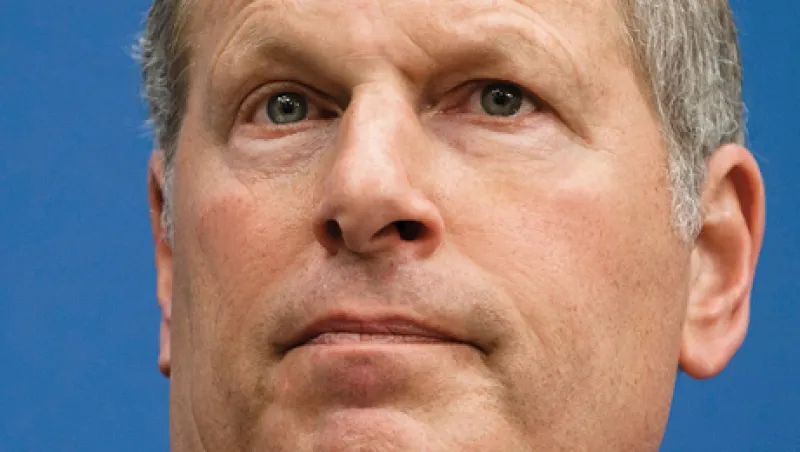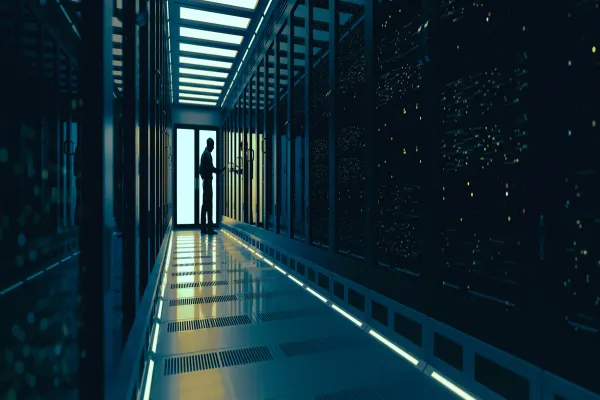Honeywell International chairman and CEO David Cote should thank Mario Monti. If the former Italian prime minister had not blocked General Electric Co.’s acquisition of Honeywell in 2001 while overseeing competition for the European Commission — leaving the Morristown, New Jersey–based conglomerate in disarray — Cote probably would never have gotten his current position. At the time, Cote (pronounced “KOH-tee”) was CEO of Cleveland-based industrial manufacturer TRW. Honeywell recruited him to replace Lawrence Bossidy, the longtime CEO of AlliedSignal, who had engineered that company’s 1999 merger with Honeywell and returned to the latter as interim CEO after the GE deal collapsed. “The size of the challenge was significantly bigger than what I realized,” says Cote, 60, referring to the cultural wars between AlliedSignal and Honeywell employees. “I was asked in some early meetings, ‘So, do you consider yourself red [Honeywell] or blue [AlliedSignal]?’ ”
Cote, who began his career as an auditor for GE’s engine division, set out to change the culture, introducing a code of business conduct called One Honeywell that emphasizes customer focus, intelligent risk-taking, effective communication, and diversity and teamwork. He also remade Honeywell’s portfolio of businesses, acquiring 70 companies and selling 50 others. The vast majority of M&A activity has been in Honeywell’s automation and control solutions (ACS) unit, one of four business segments. The others are aerospace, performance materials and technologies, and transportation systems.
The results have been impressive. Honeywell’s revenue has grown from $22.1 billion in 2003 to $37.7 billion last year. During that period its business segment margin jumped from 10.6 percent to 15.6 percent. Its stock price has soared from $24 a share at the start of 2003 to more than $73 in mid-April of this year. Cote met with Institutional Investor Editor Michael Peltz last month at New York’s Mandarin Oriental hotel, where Honeywell held its annual investor conference, to discuss the turnaround and his recent efforts to get politicians in Washington to address the debt crisis.
Institutional Investor: What’s it like managing a company that is involved in such a broad swath of businesses? I assume you don’t get bored.
Cote: No, you don’t. At nearly $40 billion in revenue, which is about where we are, it’s tough to get bored in the first place. We’re involved in a number of different industries, but one of the things that we laid out at our investor conference today was how it’s a small number of business models. So if you look at ACS, there are only three different business models; they are just in a lot of different products. Performance materials has three models, aerospace really has two business models, and transportation systems has two models.
Are there similarities in the way you approach the different businesses?
Yeah. One of the things that unite us is this common process focus — so, velocity product development, the Honeywell operating system, functional transformation and pursuing what we call organization effectiveness. That applies across all of our businesses. The other thing is making sure that we have a great position in a good industry, which we spend a lot of time on. A third similarity would be that we want to be in stuff where we can differentiate with technology, not stuff where rapid technology change can put us out of business. The other similarity across the whole company is the ability to globalize. Whatever the business is, globalization is an opportunity for us.
Can you take us through the different models in one of the businesses?
Sure. For ACS, in its products business, everything is multibrand, multichannel, differentiated with technology. Then you have the process controls business, which is a single model, selling a little more than half into oil and gas and the rest into pulp and paper and petrochemicals. There the business model is big project, being able to do something hugely complicated — largely a software business. So you go to something like the new Shell gas-to-liquids plant in Qatar, and there are more than 200,000 input and output points. The plant uses Honeywell controls to automate different functions throughout the facility. The control room is basically the cockpit for the entire refinery. We make the whole thing.
What about ACS’s building solutions and distribution?
The similarities there would be its channel to market. So when you go into a building like this and replace everything — you usually put in everything new — you’re working with the customer and using all Honeywell equipment. The same thing is true when you go to the distribution chain, called ADI. If you go there, you can buy a Honeywell product for security systems and fire systems, but you can also buy competitors’ products.
Defense is a smaller part of the business than when you became CEO.
Much smaller. I haven’t tried to restrict growing our defense business, but I’ve never wanted to acquire there, because I didn’t feel like the timing was right. If you take a look at the defense industry, the cycles are unbelievable. People get excited here, buy here and die here. That’s not what we want to do. Other than one small purchase, we’ve never acquired in defense. Whereas if you take a look at most of our other businesses, we were able to grow them a lot faster and we were able to acquire.
The other thing about our defense business that’s different is that it’s more of a channel-to-market model. In other words, the products that we sell in aerospace on the commercial side are pretty much the same products we sell on the defense side. For example, we make small jet engines, and in some cases we sell them into the commercial market and in some cases we sell them into defense applications.
So as long as one of those industries is doing okay . . .
Well, that’s a good point because it also allows us to shift engineering resources, and we can do all this remotely. So I can have 100 engineers up in Minneapolis that work on a defense project. The project doesn’t work out, so 40 of them aren’t going to be needed. I need 40 engineers to work on similar types of products on the commercial side. I don’t have to lay off 40 and add 40. I don’t have to transfer 40. All we have to do is assign them mechanically and they just go online and start doing their jobs again. It gives us huge flexibility. It was a big change. It was one of the things that [aerospace CEO] Tim Mahoney did when he was our engineering leader in that business.
What are the biggest challenges facing Honeywell?
I don’t worry too much about anything internally. And I don’t worry much about our industries because we’ve pretty much got that sorted out and I feel very good about the evolutionary process we’re on. The thing I do worry about is the overall macro situation. I keep saying this everywhere, especially in D.C., that the world’s big democracies are in gridlock over debt. Japan, India, the EU, the U.S. — everybody’s in gridlock over excessive debt. And if they don’t start doing something — and this is where I keep saying that the U.S. could exercise global leadership — there is a very good chance we stick in this kind of 2 percent GDP/8 percent unemployment environment for a long time. And that’s just a tough situation to keep growing in.
How did you get involved in the U.S. debt debate?
It started when I was asked to be a member of the president’s National Commission on Fiscal Responsibility, commonly referred to as the Simpson-Bowles Commission. And it was ironic because at first you find yourself hearing about it and going, “Oh, I don’t know if I want to do something like this.” But I’d been complaining — I grew up in New Hampshire, where we tend to be fiscally conservative. So when I was asked to be on this commission, I said, “Geez, how do I say no about something I’ve been complaining about?”
What was your board’s reaction?
I sent a note to my board when I was looking at accepting the appointment, saying: “I can promise you I have not forgotten what my primary job is, to make sure Honeywell does well. And I am never going to forget that with anything I do.” I was concerned that some board members might say: “What are you fooling around with that stuff for? Stay back here in River City.” But not one of them reacted that way. I got all kinds of really nice comments from them: “This is an important thing for the country. It’s good that you’re in the middle of it.”
What year was that?
That was 2010. We issued our final report on December 1, 2010. Of course, nobody did anything. The thing the report did do was raise awareness so that everybody started paying attention to the debt problem. Very few, including me when I first started, realized how bad it was going to get.
Tell us about the Fix the Debt campaign.
Think of it as a follow-on effort to the commission, to try to get politicians focused on the significance of getting something done here. We have a bunch of people who all talk about the need for job creation, and then they won’t do the one thing that would generate the most jobs, and that’s fixing this debt. So we wanted to make sure that message was out there. The effort already existed, but it was small, nascent almost. I said I’d join but only if Alan Simpson and Erskine Bowles would join also. So I talked to Erskine, and I talked to Alan, and they both said they would.
And then we said, “All right, we need to figure out how to fund this.” And I managed to reach out to a lot of my friends, CEOs, and they recognized the same thing that I did. The line that I would say resonated with a lot of the folks that were recruited was, “I don’t want to be one of the guys, eight months from now, if the world is in flames, sitting there going, ‘Ah, maybe I could have done something.’ ” Look, in the ten years I’ve been doing this job, there’s not a single cause I have ever gone out on a limb for, because I just don’t think that’s generally smart for a CEO to do. But there are those times when it’s not smart to just sit there and be a free rider and let others carry the weight.
We raised something like $40 million from CEOs of companies saying: “Yeah, this is important enough. We need to try.” And I told all of them at the time I recruited them: “I can’t promise that we’ll be effective. All I can promise is that we are going to try.”
What are you doing?
Several things. One is trying to bring politicians together, because both sides don’t talk as much as they should, even though you would think they should be able to at least start a conversation. The second is more a grassroots effort in the states, because some of this is, politicians have to feel that kind of voter support that says, “For God’s sake, do something.” You need to get it so that the risk of doing nothing is a lot greater than the risk of doing something. The third one is idea generation: creating this kind of environment where you can put ideas out there, people can start to talk about them, and it’s not owned by either side.
And scary as it might seem to think about, as we got toward the end of last year, if we hadn’t been in there arguing as strongly as we had with the data that we had and the CEOs that we were able to bring to bear, I’m not convinced we wouldn’t have gone off the fiscal cliff.






